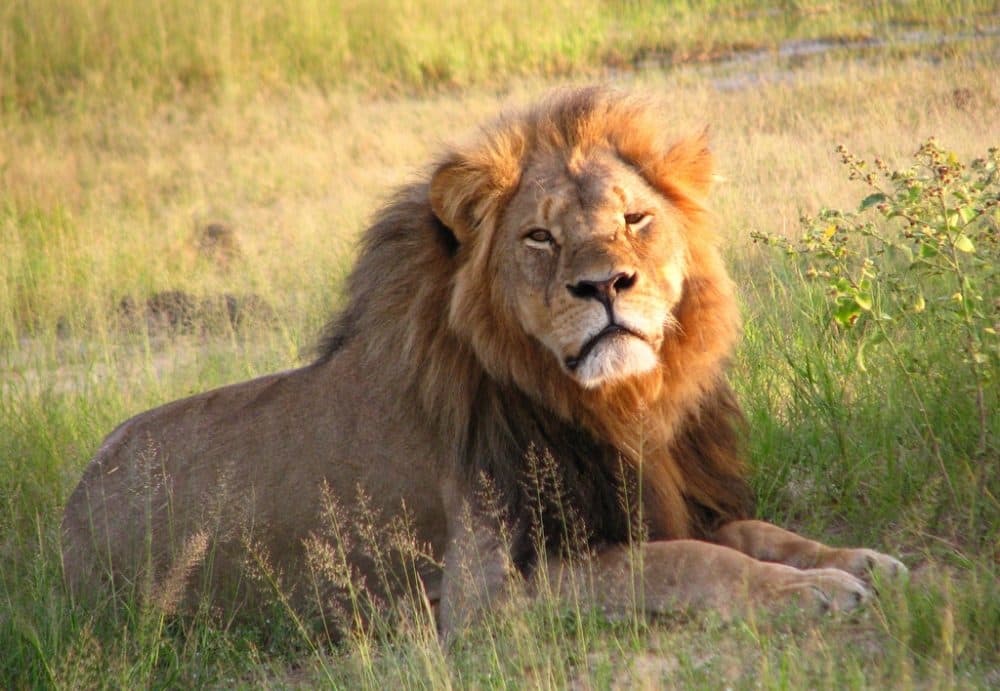Advertisement
Hunter Defends Big Game Hunting
Resume
The professional hunter who helped an American kill a popular lion named Cecil in Zimbabwe last month said in court today that he had not done anything illegal. He is accused of luring Cecil off of a park where the lion had protected status, onto a neighboring game farm, then trying to destroy the lion's tracking collar.
Zimbabwean officials now want to extradite two Americans: Minnesota dentist Walter Palmer, who shot Cecil with a bow and arrow, and Dr. Jan Seski, a Pennsylvania doctor who killed a different lion in a different hunt a few months earlier. Both deny wrongdoing.
The killing of Cecil sparked global outrage. After speaking with animal science professor and author Temple Grandin, the director of Oxford's Wildlife Conservation Research Unit and a regional director of the International Fund for Animal Welfare, Here & Now's Robin Young gets a hunter's perspective.
Ben Carter, executive director of the Dallas Safari Club, a group that advocates for hunters, says it would have been illegal to bait Cecil the lion off protected land in Zimbabwe in order to kill the animal, but he defends hunting as a better way for older animals to die than being torn apart by other predators.
Interview Highlights: Ben Carter
On the ethics of luring an animal out of a protected area
"I believe in legal, ethical hunting. But you also need to understand some of the laws and rules over there. You cannot, it is strictly illegal, to bait an animal outside of a national park. But the way the rules are set up in Zimbabwe, if that animal leaves the park, he's fair game. Now if you try to entice him to come out of the park by baiting, that is illegal. I don't know what happened on that case. I don't know if they did that or they didn't do that. That'll be for a court to decide, I suppose."
Why do people hunt big game?
"The real fact is - and this is the part that people don't want to talk about, or don't want to accept - but the reality of the world is economics comes into play with everything. Africa is a very poor country. They don't have a lot of resources. They barely have wildlife departments that can manage the populations that they have. It costs money to manage wildlife, and nobody is paying the money but hunters. Hunting is the only mechanism in place that is ensuring that we have wildlife in Africa. I know that's a conflicting statement to people that don't stop to think about it, but a lot of the people that are immediately turned off and don't want to talk about it don't want to listen and go through the facts."
"There's an awful lot of people that still believe in the adventure and romance of being out in Africa, out in the wildest parts of it, for three weeks with just you and a guide and the trackers."
"But the facts are the hunting dollars that go over there, a person that has a concession pays multiple hundreds of thousands of dollars to have that concession. That concession goes back to the indigenous people that have that area or whatever, as well as the government. That's what pays for the management. Nobody else is paying for it. The government doesn't have the funds to do that. And people think that wildlife just manages itself, that if you leave it alone, it'll be fine."
On whether or not there's been a rise in "canned hunting"
"I would disagree with that somewhat. I don't think that that's the case. I think that in order to hunt any of what would be considered the 'dangerous game,' that's probably going to be a three-week hunt. And there's an awful lot of people that still believe in the adventure and romance of being out in Africa, out in the wildest parts of it, for three weeks with just you and a guide and the trackers and people like that, and experiencing the same thing that people experienced a hundred years ago. And I think that's one of the motivations for most people to go and do it."
On what he's hearing from members of the Dallas Safari Club
"A lot of people are very disturbed that uninformed people are organized probably a little better than we are to get a message out, whether or it's true or false. And I think an awful lot of the stuff that comes out, the hysteria that the general public jumps on board with, is all misinformation. Most people that I know that are hunters are passionate about it, they love wildlife, the love the whole outdoor experience."
"That's not going to say we don't have bad apples in our community as well, but I can tell you the Dallas Safari Club only believes in legal, ethical hunting, and we know that the majority of the population no longer is pro-hunting or are hunters. The hunters and the fisherman make up 40 million people in the United States, so there is a pretty large segment of people out here that love the outdoors and love hunting and fishing, and I think most of those people try to do the right, ethical thing. They know that we're under a microscope, and nobody wants to lose this opportunity to enjoy the outdoors by continuing to hunt. I want to be able to take my grandkids hunting, and let them experience what I've experienced. Hunting takes you out in nature right with the animals, and you really get to see them more than you do in any other way."
Guest
- Ben Carter, executive director of the Dallas Safari Club, a group that advocates for hunters.
This segment aired on August 5, 2015.